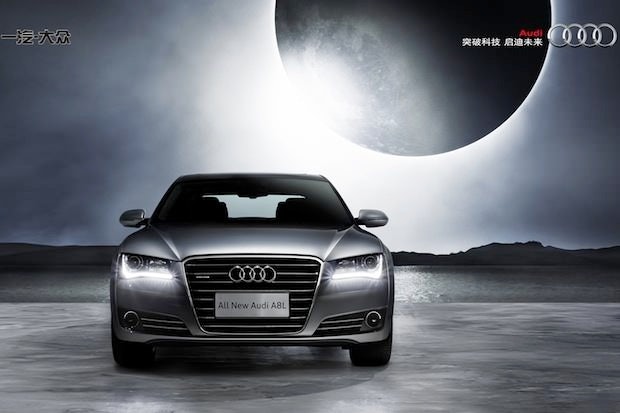
Audi is specifically called out for apparent price fixing in Xinhua's recent article.
A trade spat between China and the European Union that started with solar panels and spilled over into luxury goods has been pronounced over by the European Union, but a provocative new Xinhua article hints that this news doesn’t mean all foreign luxury companies are off the hook for other types of investigations.
The EU and China reportedly “prevented one of the biggest trade spats between two of the world's largest economic powers from spiraling into a broader trade war,” read a Wall Street Journal article from this weekend, referring to a new deal reached on a controversy over China’s solar panel industry that caused China to lodge direct and indirect threats against various EU luxury exports, including cars, wine, and chocolate.
China was pronounced the champion of the trade dispute after the EU’s solar panel investigation “ended with a whimper on Saturday,” said the New York Times, when it settled for a pledge from China not to export solar panels below .56 Euros a watt, “a price about 25 percent lower even than when the case began.”
In order to possibly rub in its victory, China has not yet officially announced an end to its dumping investigation of European wine despite the fact that EU Trade Commissioner Karel De Gucht told reporters that the two have agreed upon a “window for discussions,” and the Chinese government "has promised to facilitate such discussions.” At this moment, we're still waiting for China to confirm this promise, according to the South China Morning Post.
China’s commerce ministry could not confirm any freeze to the EU wine investigation, the website associated with the Communist Party mouthpiece the People’s Daily reported on Monday, citing an unnamed official.
A lawyer representing the Chinese industry association that filed the wine complaint said the firm had not received any notice on the freezing of the probe, the website www.people.com.cn said.
“The relevant investigation is still proceeding regularly,” Yao Fengwen, a lawyer with Bo Heng (Beijing B&H Associates) law firm, told the site.
Financial Times is also not so sure of Beijing’s intention to immediately drop investigations of wine and polysilicon, a solar panel component which has also made its way into the dispute:
Brussels had been hoping those related cases would be dropped as part of a settlement. Their fate was not immediately clear on Saturday. One EU official believed these were still alive – contrary to some press reports.
While the EU’s confident statement shows that China is likely to come around on the wine issue and stop accusing French, Spain, and Italian exporters from keeping prices too low, a recent Xinhua article reveals China's possible new foreign target for investigation: luxury automakers.
Just as the trade dispute was winding down, Xinhua News Agency published an incendiary article arguing that "foreign carmakers are reaping exorbitant profits selling imported luxury cars in China and should face an anti-trust investigation," according to Reuters.
During the tense times of the EU conflict, China previously allegedly threatened to conduct an anti-dumping investigation into European luxury autos, based on a statement by European sources. If Beijing had truly been mulling this kind of action, Xinhua’s report would represent a major reverse in policy if it is paving the way for an official government investigation, as some experts believe.
Xinhua criticizes foreign automakers for inflating their China prices on imported cars in order to deflect claims that China's tariffs are the main cause of higher prices. According to Reuters,
It cited a man surnamed Qu who had bought an Audi Q7 (NSUG.DE) in Canada for 78,000 Canadian dollars, or about 460,000 yuan ($75,000), and who was shocked to see the same car on sale in China for 1 million yuan.
The article also makes accusations against non-EU-based automakers:
It also said similar price differences existed between some unspecified Land Rover models made by Jaguar Land Rover TAMOJL.UL as well as the BMW X5 (BMWG.DE). JLR is owned by India's biggest carmaker by revenue, Tata Motors Ltd (TAMO.NS).
Xinhua did not make clear where it got the price information it cited. The automakers could not immediately be reached for comment.
However, as is probable with China's wine accusations, this may all be bluster coming from the government at this moment. Rao Da, secretary general of the China Passenger Car Association and critic of foreign carmakers’ “monopolies” over the sale of imported cars, told Reuters he “thought it was unlikely the government would investigate the luxury car market.”